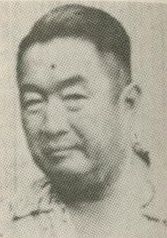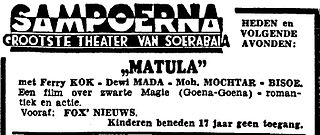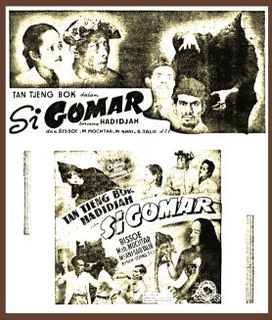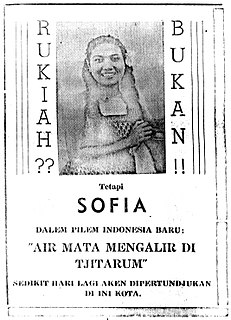Related Research Articles

Kartinah is a now-lost 1940 romance film from the Dutch East Indies that was written and directed by Andjar Asmara. The film, Andjar's directorial debut, follows a nurse and her superior as they fall in love in the Air Raid Preparation team. Produced by The Teng Chun's New Java Industrial Film, Kartinah was heavily subsidised by the country's government and through product placement. Although it was a critical failure, the new actors signed with the studio for Kartinah gave New Java Industrial Film increased production capabilities.

Fred Young was an ethnic Chinese film director and producer active in the Dutch East Indies and its successor state, Indonesia. He reportedly studied film in Hollywood as a youth, but only entered the nation's film industry in 1940. After he made his debut as a writer with Sorga Palsoe, he was involved in some 36 productions, 23 as director.
Boenga Roos dari Tjikembang is a 1931 film from the Dutch East Indies directed, produced, and filmed by The Teng Chun. Based on a 1927 novel of the same name, it follows the complicated romantic situations of two generations of ethnic Chinese in the Indies. An early example of domestic sound films, the film was remade in 1975.
Sam Pek Eng Tay is a 1931 film directed and produced by The Teng Chun and released in the Dutch East Indies. It is based on the Chinese legend The Butterfly Lovers, which follows the doomed love between a rich girl and a commoner boy. The film was a commercial success, inspiring The Teng Chun to direct several further films based on Chinese mythology. The name derives from the given names of the legend's two main characters, Liang Shanbo (梁山伯) and Zhu Yingtai (祝英台).

Oh Iboe is a 1938 film from the Dutch East Indies. Directed by The Teng Chun and starring Lo Tjin Nio and Bissu, it followed a suffering of a family after the matriarch dies. The film was one of several produced by The which dealt with modern stories, following Gadis jang Terdjoeal the year before. It is likely lost.

Panggilan Darah is a 1941 film from the Dutch East Indies written and directed by Sutan Usman Karim and produced by Tjho Seng Han for Oriental Film. The black-and-white film starred Dhalia and Soerip as orphaned sisters trying to make a living in the colonial capital of Batavia before moving to Kudus to work at a clove cigarette factory.
Si Tjonat is a likely lost 1929 bandit film from the Dutch East Indies directed by Nelson Wong and produced by Wong and Jo Eng Sek. Based on the novel by F.D.J. Pangemanann, the silent film followed an indigenous man who, having killed his fellow villager, flees to Batavia and becomes a bandit. After kidnapping an ethnic Chinese woman, he is defeated and brought to justice.
Sorga Palsoe is a 1941 film from the Dutch East Indies which was directed by Tan Tjoei Hock for Java Industrial Film. The tragedy, starring Lo Tjin Nio, Tong Hui, Lim Poen Tjiaw, and Rohana, was a commercial failure. It is likely lost.
Poetri Rimba is a 1941 film from the Dutch East Indies which was directed by Inoe Perbatasari and produced by The Teng Chun for Jacatra Film. A love story, it tells of a man who rescues a woman from a gang of thieves and escapes through the jungle.
Elang Darat is a 1941 film from the Dutch East Indies which was directed by Inoe Perbatasari and produced by The Teng Chun for Jacatra Film. A detective film, it follows a man who comes to a village to track the villainous bandit known only as "Elang Darat".

Matula is a 1941 film from the Dutch East Indies which was directed by Tan Tjoei Hock and produced by The Teng Chun of Java Industrial Film. The black-and-white film, now likely lost, follows a young man who tries to give a woman's soul to a shaman as payment for being made handsome.

Ouw Peh Tjoa, also known by the Malay-language title Doea Siloeman Oeler Poeti en Item, is a 1934 film from the Dutch East Indies. It was directed and produced by The Teng Chun. Adapted from Legend of the White Snake, a Chinese folktale, it follows a magical snake who passes as a human but ultimately dies. The film, now possibly lost, was followed by one sequel, Anaknja Siloeman Oeler Poeti, in 1936.

Roesia si Pengkor, also known as Hadji Saleh, is a 1939 film from the Dutch East Indies which was directed and produced by The Teng Chun for his Java Industrial Films. Starring Da'ing, Bissu, and Hadidjah, this black-and-white film followed a young woman who is saved from deceptive suitors by her beloved and a man known as "Si Pengkor".

Poesaka Terpendam is a 1941 film from the Dutch East Indies produced by Tan's Film and starring Roekiah, Djoemala, and Kartolo.

Hadidjah was an Indonesian film actress best known for partnership with Moh Mochtar in seven films released by Java Industrial Film between 1939 and 1941. She was the mother of Citra Award-winning musician Idris Sardi.

Si Gomar is a 1941 film from the Dutch East Indies which was written and directed by Tan Tjoei Hock and produced by The Teng Chun. Starring Hadidjah, Mohamad Mochtar, and Tan Tjeng Bok, the movie follows a brother and sister who are separated by robbers and almost marry before their cousin recognises them.

Air Mata Mengalir di Tjitarum is a 1948 film from what is now Indonesia, written and directed by Roestam Sutan Palindih for the Tan & Wong Bros Film Company.

Pantjawarna is a 1941 film from the Dutch East Indies.

Saputangan is a 1949 romance film from what is now Indonesia. Directed by Fred Young and starring Chatir Harro, Noorsini, and Astaman, it follows a young doctor who, after his fiancée is blinded in an automobile accident, becomes an optometrist and restores her sight.
References
- 1 2 Filmindonesia.or.id, Gadis jang Terdjoeal.
- ↑ Biran 2009, pp. 147–150, 163.
- ↑ Biran 2012, p. 291.
- ↑ Heider 1991, p. 14.
- ↑ Biran 2009, p. 351.